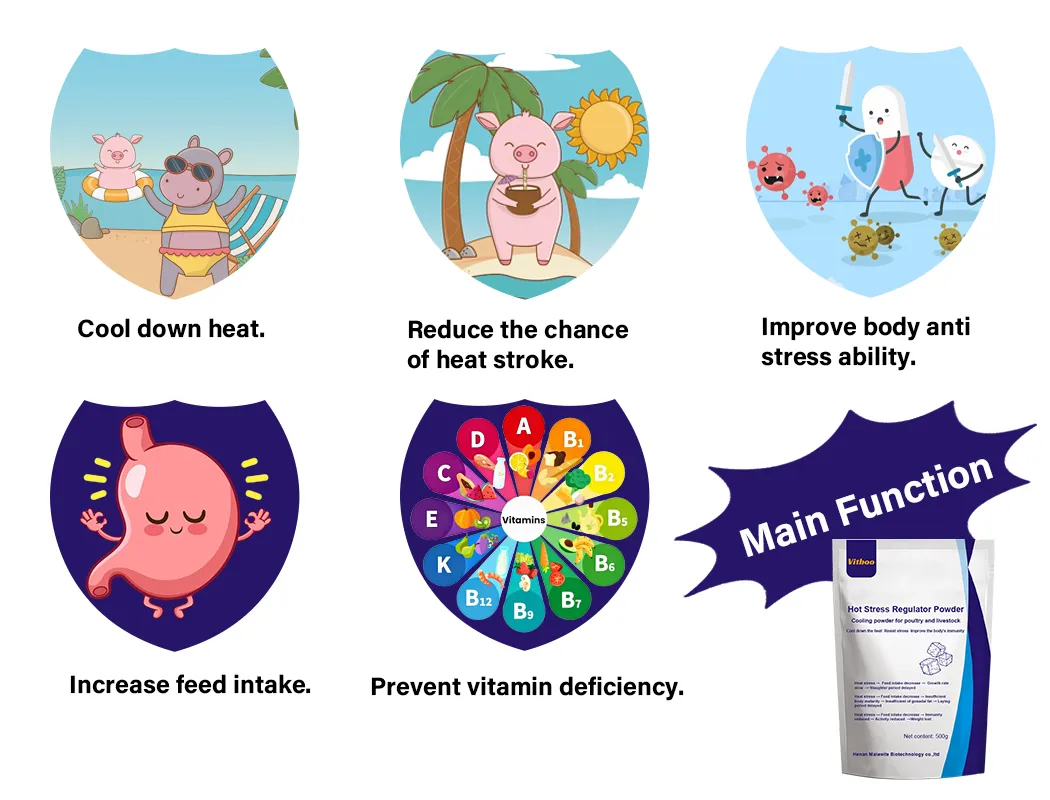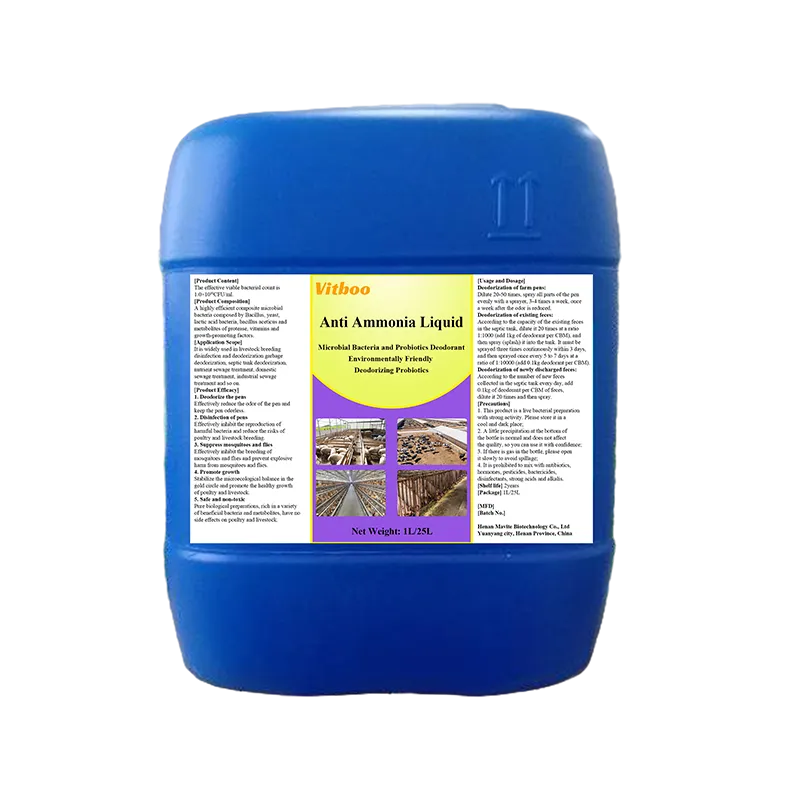The continuous high temperature in summer is very unfavorable to livestock and poultry farming.
In order to avoid the high temperature, livestock and poultry farming will suffer heavy losses.
Our company vitboo contacted the experts of the Municipal Animal Husbandry and Veterinary Service Center to compile a "Guide to Heatstroke Prevention and Cooling". Take a look now!
I.Strengthen feeding management
1. Supply sufficient clean drinking water.
In hot seasons, livestock and poultry drink more water. Insufficient water intake will directly affect livestock and poultry production and health, especially for dairy and lactating livestock. Sufficient, clean, and cool drinking water sources must be provided to ensure free drinking, so that livestock and poultry can replenish the water lost due to large amounts of heat dissipation in a timely manner. You can also add appropriate amounts of salt, potassium chloride, sodium bicarbonate and other electrolytes to drinking water to enhance the effect of heatstroke prevention and relieve heat stress.
2. Rationally adjust the diet structure.
Appropriately increase the protein level and energy concentration of the diet, increase green and juicy feed and wet mix to improve the appetite of livestock and poultry. Appropriately increase the proportion of easily digestible and palatable feed, and reduce the proportion of high-energy and high-fat feed. Appropriately add multivitamins and other heat-relief items to enhance the ability of livestock and poultry to resist heat stress and relieve heat stress reactions. Increase feed intake.
3. Adjust feeding time and method.
Livestock and poultry are prone to loss of appetite during hot seasons. They should avoid hot periods and feed in the early morning and evening when the temperature is relatively low, according to the principle of feeding less and more frequently, and feeding more at night. Feed them in the middle of the day or feed them a certain amount of green and juicy feed (such as watermelon peel, pumpkin, vegetable leaves, etc.). You can also feed them in advance in the morning and feed them at night; increase the amount of feed in the morning and evening, and reduce feeding at noon. For grazing, it is better to change daytime grazing to morning and evening grazing, and try to avoid direct sunlight at noon.
4. Pay attention to reducing other stresses.
Avoid behaviors that may induce group stress, such as transferring, dividing, transporting, and vaccinating in hot weather. If necessary, it is recommended to choose the evening when the temperature is lower and take heat prevention and cooling measures to avoid unnecessary losses. The time of release should be appropriately advanced, and all animals should be in and out as much as possible, and old, weak, and low-yielding livestock and poultry should be eliminated in a timely manner. Minimize the transportation of livestock and poultry during high temperature periods. Even if transporting at night, the density should be reduced to avoid crowding and heat stroke.
Vitboo can be added to feed to help
1. High temperature weather causes body temperature to rise and feed intake to decrease.
2. Heat stress causes egg production rate to decrease and egg quality to decrease, such as sandy eggs, soft-boiled eggs, deformed eggs, etc.

II. Control the ambient temperature
1. Cool down the pens.
Reduce sunlight exposure by widening the eaves of the breeding pens, setting up pergolas, and covering the pens with shade nets above or around the pens. You can also mitigate solar radiation and lower the overall ambient temperature by strengthening the greening of the field and planting vines around the houses. If conditions permit, you can spray a small amount of mist on the ground and the surface of livestock and poultry to lower the temperature in the pens. Remember not to directly flush the livestock and poultry for a long time to cool them down.
2. Reduce stocking density.
In breeding production, especially in large-scale farms, the number of livestock and poultry groups per unit area is large and the density is high. They will generate a large amount of radiant heat, which will have a synergistic effect with the external environmental temperature, increasing the possibility of heat stress. Therefore, it is necessary to properly adjust the production plan, reduce the stocking density, reduce the heat generated by livestock and poultry themselves, and lower the temperature in the pen to create a more comfortable living environment for livestock.
3. Strengthen ventilation in pens.
Ventilation can not only dissipate the heat generated in the pens, but also help livestock and poultry dissipate heat to mitigate the adverse effects of high temperature on livestock and poultry. Do a good job of repairing and maintaining the fan, exhaust fan, wet curtain spray and other facilities and equipment in the livestock house to ensure their normal operation. Under hot and dry climate conditions, wet cooling can be used for cooling. For medium and large livestock such as pigs, cattle and sheep, they can be directly showered to cool down, but it is not suitable to use deep well water, underground spring water and other low-temperature water to directly shower; only a small amount of wet cooling can be used for domestic animals, because they are more sensitive to humidity. Long-term high humidity in the house will lead to the occurrence of epidemics. Note that when spraying water or spraying, ensure ventilation to prevent stuffiness.
4. Prepare emergency plans for power outages.
High-temperature seasons are often peak periods of electricity consumption, so emergency preparations for power outages should be made. Large-scale farms with conditions should have their own generators to prevent major losses caused by sudden power outages.
III.Strict sanitation and disinfection
1. Strengthen environmental sanitation and disinfection.
In hot summer weather, harmful gases from livestock and poultry manure are emitted faster, mosquitoes and flies breed, and manure and dirt must be cleaned up and flies and rats eliminated in a timely manner. At the same time, it is necessary to do a good job in the maintenance of livestock and poultry manure treatment facilities and equipment, and promptly remove manure and sewage in the pens to keep the pens clean and hygienic; regularly disinfect the pens and eliminate sources, and do a good job in killing rats, mosquitoes and flies to prevent the spread of diseases.

2. Prevent and treat common summer diseases.
Immunize animals in a timely manner, strengthen immunization against major animal diseases, and make up for those that have exceeded the immunization protection period or have not been immunized. If livestock and poultry are found to be sick, veterinary professionals should be consulted in time. At the same time, strengthen inspections and observations. If livestock and poultry show symptoms of heatstroke, they should be transferred to a cool, ventilated and quiet place in time, and emergency cooling should be carried out. Severe cases should be treated in time.
3. Appropriately reserve heat-relief materials.
In case of continued high temperatures, farms should appropriately reserve heat-relief materials for emergency use. If sick livestock and poultry are found, they should be isolated quickly and treated symptomatically in time.
Phone:+86-19138056813
Tel:+86-0371-88959050
Email:info@zsybio.com
Address:Zhengzhou City, Henan Province, China